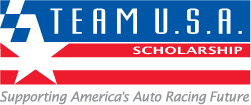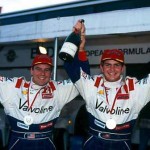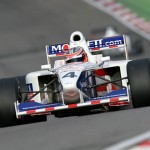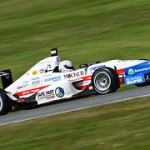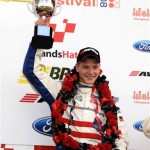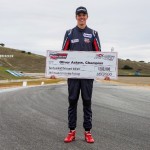The principal aim of the Team USA Scholarship is to provide opportunities for young American race car drivers at an early stage in their careers. This includes funded drives and introductions to influential figures within the sport who will provide valuable insight and contacts to assist their progress up the racing “ladder.”
The Team USA Scholarship was founded in 1990. At the time, opportunities for young American drivers were few and far between. Also, Formula Ford in England was going through a lean spell. British championship races were being canceled due to a lack of entries and it seemed that the future of the Formula Ford Festival, which had provided an end-of-season opportunity for talented up-and-coming drivers from around the world since 1972, was in jeopardy. So it seemed like a good idea to raise some sponsorship and create an opportunity for a talented young American to contest the Formula Ford Festival and World Cup at Brands Hatch. A program was instituted at relatively short notice and Jimmy Vasser was dispatched to England…where he faced one of the largest entries the Festival had ever attracted, over 200 cars!
Vasser, unfortunately, was eliminated in the early stages of the competition, but a more concerted effort the following year, in 1991, allowed Bryan Herta to progress impressively all the way through to the Grand Final.
In 1995, with Formula Ford again going through the doldrums following a decision to replace the trusty Kent engine with the newer Zetec motor, the decision was made to enter that year’s Team USA Scholarship winner (Memo Gidley) in a non-championship end-of-season International Formula 3 race at Donington Park in England.
The high cost of F3 and the growth of American Dan Partel’s Formula Vauxhall/Lotus initiative, through his European Formula Drivers Association, led to a switch to the EFDA Nations Cup event, also at Donington, in 1996.
In 1999, the Team USA Scholarship switched its attention to Formula Palmer Audi, which offered a four-race Winter Series in England and unparalleled value for money.
The scholarship has continued to provide opportunities for American youngsters to compete on an international stage, in order to expand the drivers’ range of knowledge about the sport as a whole. After a few years of focusing instead on the New Zealand International Formula Ford Championship (starting in 2001/2002), which was especially attractive due to favorable currency exchange rates, the Team USA Scholarship switched back to Formula Palmer Audi Autumn Trophy in time for the 2005 season. FPA continued to provide an excellent training ground until a decision was made to return to the scholarship’s roots and provide opportunities for drivers at an earlier stage in their development. Hence a move back to contesting the Formula Ford Festival at Brands Hatch — and the fast-emerging Walter Hayes Trophy at Silverstone — in 2008.
The program’s increasing reach and credibility allowed the introduction of a “second tier” level, beginning with an entry in the senior Formula Ford Duratec category in 2011, followed by a switch to the popular and extremely competitive Formula Renault BARC Winter Series in 2012 and then fielding a car in New Zealand’s Toyota Racing Series in 2013/2014.
All along, entries into the Formula Ford Festival and Walter Hayes Trophy have continued to provide the primary focus. Josef Newgarden (left) became the first American driver to win the Festival in 2008 — and went on to win his first IndyCar Series championship with Team Penske in 2018 — while Conor Daly (2008), Connor De Phillippi (2009), Tristan Nunez (2012) and, most recently, Max Esterson (2021) also have earned top honors in the Walter Hayes Trophy at Silverstone.
In 2016 and 2017, the Team USA Scholarship winners also were granted an opportunity to contest the Mazda Road to Indy USF2000 $200K Scholarship Shootout. At stake was another scholarship, valued at $200,000, to ensure entry into the following year’s Cooper Tires USF2000 Championship — the first step on the Road to Indy Presented by Cooper Tires, which provides the means for drivers to progress all the way from the grassroots of the sport to the NTT INDYCAR SERIES and the Indianapolis 500.
Former karting standout Oliver Askew added the inaugural Road to Indy prize to his 2016 Team USA Scholarship and went on to win the USF2000 championship in 2017. He progressed quickly through the Indy Pro 2000 Championship Presented by Cooper Tires before claiming the Indy Lights Presented by Cooper Tires title in 2019 and making his NTT INDYCAR SERIES debut in 2020.
Fellow 2016 Team USA Scholarship winner Kyle Kirkwood also has catapulted himself to the top echelons of the sport after winning Road to Indy titles in 2018 (USF2000), 2019 (Indy Pro 2000) and 2021 (Indy Lights).
